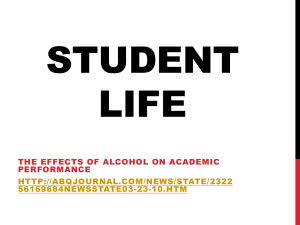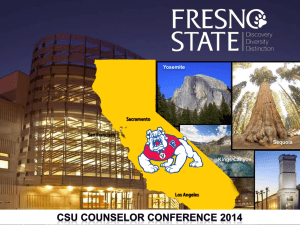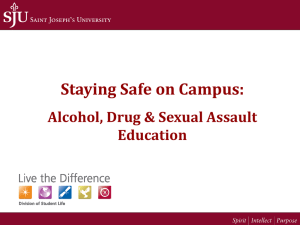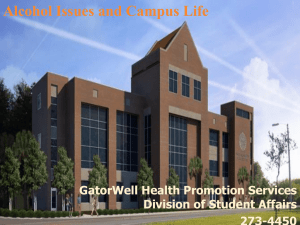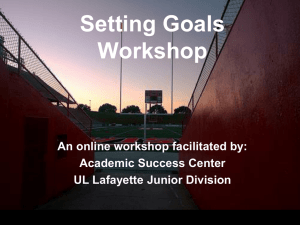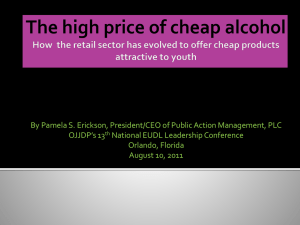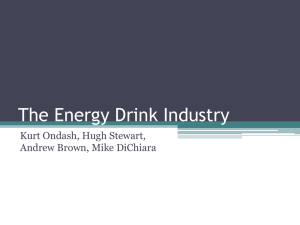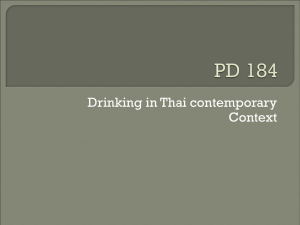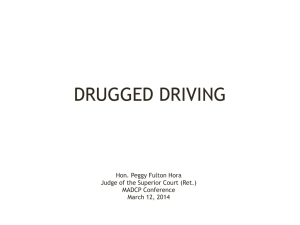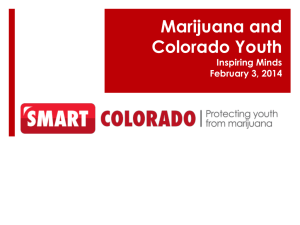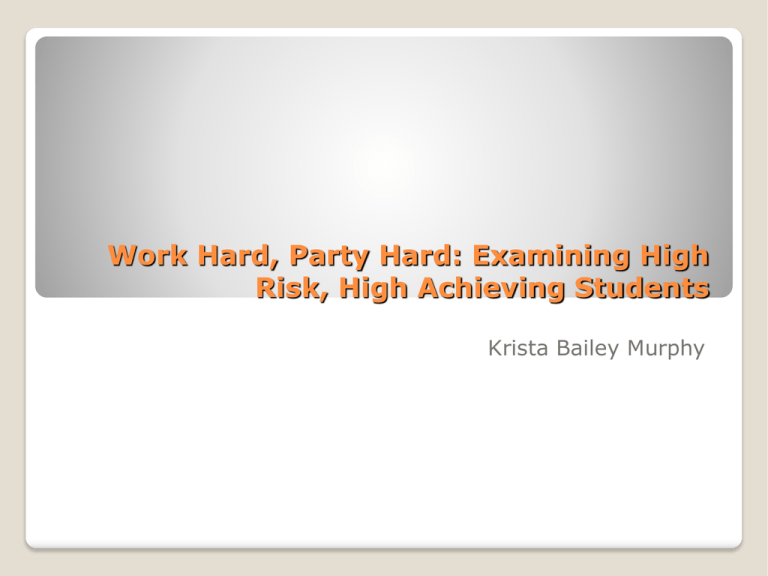
Work Hard, Party Hard: Examining High
Risk, High Achieving Students
Krista Bailey Murphy
Why is this research important?
Brief review of relevant literature
Methods
Results
Discussion
Questions
Overview
Importance of degree persistence &
attainment
High levels of injury/death during a period
of peak health
Merge quantitative and qualitative data to
better understand the full picture of risk
taking amongst college students
Educate college administrators about best
practices
◦ Best allocate resources
Why is this research important?
Literature Review
“That awkward period between sexual
maturation and the attainment of adult
roles and responsibilities” (Dahl, 2004, p.
9)
Psychosocial moratorium (Erickson, 1968)
Changes in industrial world led to longer
period of adolescence (Arnett 2000;
Erickson, 1968)
They are “just” adolescents!
Risk taking falls within the larger context
of decision-making
While decision-making implies the choice
between multiple known alternatives, risk
taking applies to a situation in which the
consequences are unknown or ambiguous
(Clifford, 1991).
•
Decision-Making
Attempts to answer why risk taking increases
between childhood and adolescence
Adolescents are NOT:
◦ Irrational or deficient in information processing
◦ More likely to believe they are invulnerable
◦ Less risk averse than adults
So what ARE they?
Socio-emotional network vs. cognitive control
network
◦ During states of emotional arousal or when with
peers
Social Neuroscience Perspective
(Steinberg, 2008)
Construct
Measure
Sample Item
Risk Perception
Benthin et al., 1993
“If you did this activity (e.g. had
unprotected sex), how much are
you are risk for something bad
happening?”
Sensation seeking
Zuckerman et al., 1978
“I sometimes like to do things
that are a little frightening.”
Impulsivity
Patton et al., 1995
“I do things without thinking.”
Resistance to peer influence
Steinberg & Monahan, 2007
“Some people think it’s better to
be an individual even if people
will be angry at you for going
against the crowd.
BUT
Other people think it’s better to
go along with the crowd than to
make people angry at you.”
Future orientation
Steinberg et al., 2009b
“Some people take life one day at
a time without worrying about the
future.
BUT
Other people are always thinking
about what tomorrow will bring.”
Indices of Psychosocial
Maturity
Risk perception (Benthin et al., 1993)
Sensation seeking (Zukerman et al.,
1978)
Impulsivity (Patton et al., 1995)
Resistance to peer influence
(Steinberg & Monahan, 2007)
Future orientation (Steinberg et al.,
2009b)
Psychosocial Maturity
Raising
hand in
class
Writing an
editorial
Alcohol
Use
Fighting
Reckless
Driving
Disordered
Eating
Drug
Use
Running
for SGA
Hooking Up
Gambling
Trying out
for the play
How does risk taking manifest itself
on a college campus?
1.A
large, national quantitative data set will provide
statistically significant evidence that students who
drink more (frequency and quantity) have lower
overall GPAs, experience more negative
consequences as a result of their drinking and
experience more impediments to academic success
2.Students who live on campus, are member of Greek
fraternities and sororities and/or are varsity athletes
will have higher levels of binge drinking than their
peers
3.Students who drink more (frequency and quantity)
engage in other risky behaviors (unprotected sex,
NMPD use, etc.) at higher rates than their peers
Hypotheses
Student-driven perspective on risk taking
and academic achievement
Give voice to students
Qualitative Goals
Methods
Risk Taking, Academic
Performance and
College Students
Quantitative
Qualitative
Analysis of
ACHA-NCHA
II Data
Screener &
Interviews
Holistic
Picture
American College Health Association National College Health Assessment II
(ACHA-NCHA II)
◦ Spring 2009 & Fall 2009 data sets
◦ 121,313 respondents
◦ 65 questions; approximately 30 minutes to
complete
◦ Student health profile - Alcohol, seatbelt use,
mental health, risk tempering behaviors, tobacco use,
birth control, exercise, illnesses
◦ Demographic questions - Age, gender, year in
school, residency, Greek affiliation, varsity athletics
◦ Reliable and valid
Quantitative Data Set
Reverse coded GPA
Combined several responses to “No
Impact” and “Impact” variables
Data Computations
Interview Process
Screening Questionnaire
Eliminated all screeners below 3.5
GPA
Contacted potential
interviewees
Conducted Interviews
Screening Questionnaire
1. In the last 30 days, on how many days did you use alcohol, marijuana, other drugs (including prescription drugs
that were not prescribed to you)? Please check the appropriate response:
o Never Used
o Have used, but not in last 30 days
o 1-2 days
o 3-5 days
o 6-9 days
o 10-19 days
o 20-29 days
o Used Daily
2. Over the last two weeks, how many times have you had five or more alcoholic drinks at one sitting? Please check
the appropriate response
o Never
o 1 time
o 2 times
o 3 times
o 4 times
o 5 times
o 6 times
o 7 times
o 8 times
o 9 times
o 10 or more times
Interview Process
Screening Questionnaire
Eliminated all screeners below 3.5
GPA & sorted by risk level
Contacted potential
interviewees
Conducted Interviews
Divide screeners into low and high risk
Low Risk Group
High Risk Group
Q1: Have not used alcohol, marijuana or other drugs Q1: Have used alcohol, marijuana or other drugs in
in the last 30 days.
the last 30 days.
Q2: Have not consumed 5 or more drinks in one
sitting in the last two weeks.
Q2: Have consumed 5 or more drinks in one sitting
in the last two weeks.
Interview Process
Screening Questionnaire
Eliminated all screeners below 3.5
GPA & sorted by risk level
Contacted potential
interviewees
Conducted Interviews
Contact potential interviewees
Paired screening questionnaires with
consent forms
Random selection process
Contacted interviewees via email
100% response rate
Low Risk vs. High Risk Groups
Low Risk Group
High Risk Group
(6 eligible respondents)
(10 eligible respondents)
3.56 GPA
3.64 GPA
(3.57 overall)
(3.67 overall)
1 male
4 females
2 males
3 females
Interview Process
Screening Questionnaire
Eliminated all screeners below 3.5
GPA & sorted by risk level
Contacted potential
interviewees
Conducted Interviews
Conduct Interviews
Full meeting took between 45-60 minutes;
interviews took between 25-45 minutes
Interviews with high risk students took longer
All interviewees answered all questions
Recorded using GarageBand and turned into
MP3 files for transcription
$20 Bookstore gift card
Interview Questions
1. Tell me about the last time you partied or socialized.
2. What does it feel like to be drunk?
3. What are the rewards of being drunk?
4. Tell me about a typical night out and tell me about an extreme night out.
5. Do you play drinking games? If so, which ones and why?
6. Have you ever driven under the influence or ridden in a car with someone you knew was intoxicated?
7. How many drinks does it typically take for you to feel drunk?
8. What is meant by a standard drink (for calculating your blood alcohol content)?
9. What is appealing about taking risks?
10. What is appealing about drinking?
11. Have you had oral, vaginal or anal intercourse? If so, please tell me about the circumstances the last
time this happened. If not, please tell me why you have chosen to abstain.
12. If you have had oral, vaginal or anal intercourse, have you used protection?
13. Please define academic achievement. What you do you think it means to be academically
successful?
14. Please define risk taking.
15. Do you see any relationship between your risk taking and your academic goals?
16. What is the difference between something that is risky and something that is not risky?
17. Do you think your risk taking will change as you get older?
18. Do you think that risk taking is always “bad?” Can you provide an example of a risk you took that
had a positive outcome?
19. I want you to think about a situation. In one situation, a group of friends decide to skip classes to go
down the shore. In the other situation, a group of friends go down the shore on Saturday. Are the friends
likely to feel closer in one situation than the other? Why or why not?
20. Can you tell me about a time when risk taking interfered with your school work? This could include
(but doesn’t have to be) missing a class, missing a deadline, not achieving your goals.
21. Do you have anything you want to add that we have not talked about?
Transcription & Analysis
All interviews transcribed for analysis
Creation of six (6) distinct categories
Coding and agreement with two
colleagues
◦ Led to the combination of two categories and
the creation of a new category
Results
Quantitative Analysis
Variable
Percent
N
1st Year Undergraduate
29.5
29,737
2nd Year Undergraduate
23.2
23,109
3rd Year Undergraduate
22.8
22,702
4th Year Undergraduate
18.3
18,209
5th Year Undergraduate
6.2
6,177
Campus Residence Hall
41.3
41,139
Fraternity/Sorority House
1.6
1,589
Other Campus Housing
5.2
5,199
Parent/Guardian
14.3
14,253
Other Off-Campus Housing
33.0
32,901
Other
4.1
4,116
Year in School
Current Residence
Demographic Variables – All
Undergraduate Students
Variable
Percent
N
Campus Residence Hall
76.4
14,426
Fraternity Sorority House
.4
76
Other Campus Housing
1.3
250
Parent/Guardian
12.6
2,384
Other Off-Campus Housing
6.7
1,260
Other
2.2
423
A
34.3
6,476
B
49.9
9,424
C
14.0
2,648
D/F
1.8
335
Current Residence
Approximate GPA
Demographic Variables – First-Year
Spring 2009 Cohort
Everything is significant!
Alcohol Use - Frequency
Housing Status & Number of Drinks
Variable
All Undergraduates
First-Year Cohort
Last 30 days: Alcohol
-.025**
-.098**
Last 30 days: Marijuana
-.073**
-.114**
Number of drinks last time partied or socialized
-.078**
-.128**
Last 2 weeks: 5 or more drinks of alcohol at sitting
-.063**
-.122**
.010**
-.033**
Last 12 months: Taken unprescribed antidepressants -.024**
-.037**
Last 12 months: Taken unprescribed pain killers
-.066**
-.081**
Last 12 months: Taken unprescribed sedatives
-.030**
-.048**
Last 12 months: Taken unprescribed stimulants
-.044**
-.061**
Last 12 months: Number of sexual partners
-.059**
-.104**
Used a method of birth control last time you had
vaginal sex
-.074**
-.061**
Last 30 days: Drive after having 5 or more drinks
Risky Behaviors and GPA
Variable
All Undergraduates
First-Year Cohort
Last 30 days: Alcohol
-.025**
-.098**
Last 30 days: Marijuana
-.073**
-.114**
Number of drinks last time partied or socialized
-.078**
-.128**
Last 2 weeks: 5 or more drinks of alcohol at sitting
-.063**
-.122**
.010**
-.033**
Last 12 months: Taken unprescribed antidepressants -.024**
-.037**
Last 12 months: Taken unprescribed pain killers
-.066**
-.081**
Last 12 months: Taken unprescribed sedatives
-.030**
-.048**
Last 12 months: Taken unprescribed stimulants
-.044**
-.061**
Last 12 months: Number of sexual partners
-.059**
-.104**
Used a method of birth control last time you had
vaginal sex
-.074**
-.061**
Last 30 days: Drive after having 5 or more drinks
Risky Behaviors and GPA
Alcohol as an Impediment to
Academic Performance
Variable
GPA
A
B
C
D/F
Anxiety
11.05%
17.19%
24.44%
37.95%
Cold/Flu/Sore Throat
13.23%
20.21%
26.07%
33.13%
Depression
5.94%
7.54%
17.18%
32.83%
Internet Use
9.08%
15.57%
23.01%
33.33%
Sleep Difficulties
14.35%
22.60%
31.94%
47.72%
Stress
17.32%
27.23%
40.28%
56.10%
Impact on Academic Performance
Variable
GPA
A
B
C
D/F
Anxiety
11.05%
17.19%
24.44%
37.95%
Cold/Flu/Sore Throat
13.23%
20.21%
26.07%
33.13%
Depression
5.94%
7.54%
17.18%
32.83%
Internet Use
9.08%
15.57%
23.01%
33.33%
Sleep Difficulties
14.35%
22.60%
31.94%
47.72%
Stress
17.32%
27.23%
40.28%
56.10%
Impact on Academic Performance
Information Received vs. Desired
61.6%
Information Received vs. Desired
Information Received vs. Desired
Qualitative Analysis
Low risk students
◦ Risk taking is something out of your comfort
zone that you usually decide to do without
thinking about the potential consequences,
which could be positive or negative to both you
and the people around you
High risk students
◦ Risk taking is dangerous behavior that could
cause you trouble, harm or impact you
negatively but you do it anyway
Defining and Conceptualizing Risk
Taking
Low risk students
◦ Risk taking is something out of your comfort
zone that you usually decide to do without
thinking about the potential consequences,
which could be positive or negative to both
you and the people around you
High risk students
◦ Risk taking is dangerous behavior that could
cause you trouble, harm or impact you
negatively but you do it anyway
Defining and Conceptualizing Risk
Taking
Risk taking is doing something different
or new that could cause you trouble or
harm, but which also has the potential for
a positive outcome
Student Definition of Risk Taking
Risk now versus high school
“Way more risks. Because, you’re not under
the supervision of your parents here so you
can kind of just do whatever you want and I
mean, not to say that, I mean, when I was in
high school I did stupid things. But here it’s
just so much easier because it’s like a playground
for making bad decisions basically. (laughter). Go
college! Woo!”
–Alison, high risk
Decision-Making
Risk now versus 30
“Because that’s the time to be mature,
start thinking about the bigger picture. I
think the time between high school and
real life is the time you can have to kind
of find yourself and kind of do what you
need to do, take risks.”
–David, high risk
Decision-Making
Knowledge does not equal action
Decision-Making
Alcohol use
◦ Badge of honor
Drug use
◦ Primarily marijuana & Adderall
Hooking up and sex
◦ Two kinds of protection
Painting a Picture of Individual Risk
Taking
Interviews with all high achieving
students
Ability to prioritize & say no
Students identified procrastination as the
biggest risk to their own academic
achievement
Academic Achievement
“I’m not impacted, but my friends are”
Peer Perceptions and Influence
Family support and pressure
Career goals (future orientation
construct)
Perceived importance of academic and
social experience
“It can be done, you don’t have to just sit in your dorm and study
all the time to be a good student I would say. I think that
coming to college and actually living there, the social aspect of it
is also part of the experience and part of growing up. Not that
that necessarily has to involved drinking, but I think that’s an
important thing in someone’s life to like go out and meet people
and learn how to socialize in that way. It plays as much of a role
as academia I guess.”
-Jessie, high risk
Achieving Both
“OK, this is cool. Umm, I feel like, uh, alright, I’m gonna say this. I
feel like academics are really based upon the individual skill sets as
opposed to their behavior. I mean, we do know for a fact that
obviously, if you are drinking 5 days out of a week than 9 times
out of 10 you’re probably not going to perform better than
someone who is just not, if you’re on the same academic level.
But, I don’t feel like having one day or even two maybe out of that
week where you sort of drink, even a little bit in excess, will
directly affect the outcome of their academics. So it’s really weird,
I feel like there’s a really fine line of how they’re affected by each
other because, like I told you about my roommate. You can have
those experiences where you just like to drink and you drink pretty
often, but you still produce well academically and then you can
have those situations where it doesn’t occur. So I feel like it’s a
very thin line and they’re very close to each other. But I wouldn’t
say one is indicative of the other, unless it’s to that big of an
extreme.”
- Ryan, low risk
Achieving Both
Discussion
All three hypotheses were supported
1.A large, national quantitative data set will provide statistically
significant evidence that students who drink more (frequency and
quantity) have lower overall GPAs, experience more negative
consequences as a result of their drinking and experience more
impediments to academic success
2.Student who live on campus, are member of Greek fraternities
and sororities and/or are varsity athletes will have higher levels of
binge drinking than their peers
3.Students who drink more (frequency and quantity) engage in
other risky behaviors (unprotected sex, NMPD use, etc.) at higher
rates than their peers
These relationships grew stronger when
just analyzing the first-year cohort
Summary of Results
Weak strength of correlations
◦ Only large effect size in correlation between
alcohol consumption and negative
consequences (especially number of days in
last 30)
Student perceptions about impediments
to academic performance
◦ Anxiety, cold/flu, internet use, sleep difficulties,
depression and stress
Willingness of students to share their
experiences
◦ Genuine gratitude for being asked
Surprising Findings
Ability of students to articulate what risks
they took, why and how they view their
risk changing over time
Articulation of socio-emotional network
vs. cognitive control network
Ability to make “good decisions”
Connection to Social Neuroscience Perspective
Risk perception
◦ Knowledge of “stupid” risks but willingness to
take risk anyway
◦ Worth potential rewards
Resistance to peer influence
◦ All interviewees were able to provide examples
Future orientation
◦ Helped keep high risk behavior to a minimum
Connection to Psychosocial
Maturity
Large sample size
Selection bias
Reliance on correlations
Statistical Limitations
What (if anything) will impact behavior?
Importance of family/support systems
What do students want information about
that we are not giving them? Do any of
your campuses do a good job in this
area?
◦ Sleep, stress, anxiety, nutrition
Open & honest conversations with
students
◦ Students are open to these conversations, but
are we asking the right questions?
◦ BASICS philosophy
Implications for Practitioners
Are we focusing so much on alcohol that
students think it is even more pervasive than
it actually is?
◦ “My mom was actually talking to someone else
who has a son who goes here and he was saying
how he almost regretted his decision to come here
because they make it seem like that’s a major part
of going to X is just drinking all the time and
stuff.”
◦ We’ve made a change at our own Orientation to a
workshop called Healthy Choices instead of a
session devoted to alcohol
Implications for Practitioners
Longitudinal study comparing students
across their four years in college
Build qualitative research base
Impact of social media/texting on desire
for meaningful conversations
Future Research
Questions
Krista Bailey Murphy
murphyk@chc.edu
215-248-7142
Contact Information


